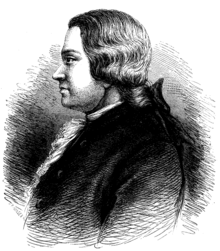Thomas Thorild
Thomas Thorild (born April 18, 1759 in Svarteborg, Bohuslän , † October 1, 1808 in Greifswald ) was a Swedish poet, writer and literary critic.
Life
Thomas Thorild was actually called Thorén from birth and only changed his surname to Thorild in 1785 (old Swedish for: Thor's flame). Thorild attended high school in Gothenburg and then studied law in Lund . In 1782 he moved to Stockholm , stayed in Uppsala from 1787 to 1788 and then spent some time in England . The defense of his dissertation in Uppsala took place in the presence of the king and by order of the king the two well-known writers Schröderheim and Leopoldt opposed. According to the defense protocol, Thorild did well. After ending up in prison in England , he returned to Sweden. Duke Karl, who after the murder of King Gustav III. headed the guardianship government for the still underage Gustav IV Adolf , felt attacked by Thorild's writings, and so Thorild was expelled from the country in 1793. Thorild went to Greifswald , then Sweden , where after some time he got a position as professor of literature and librarian. Here he married his lover, Gustava Steglig von Kowsky, on September 11, 1797 in St. Nikolai, who had accompanied him into exile and with whom he had two children in free marriage. He spent 13 years at the University of Greifswald and is buried in Neuenkirchen (near Greifswald) .
meaning
Thorild was a supporter of Sturm und Drang literature and an opponent of French-inspired classicism , the main representatives of which in Sweden were Johan Henrik Kellgren and Carl Gustaf af Leopold . Thorild's great role models were Jean-Jacques Rousseau , Friedrich Gottlieb Klopstock , Ossian and the young Johann Wolfgang von Goethe . This was expressed by the fact that Thorild preferred free forms and great passions and disdained all coercion. His first great poem was the non-rhyming poem Passionerna ("The Passions"), published in 1781 , in which he expressed a pantheistic feeling for nature.
Thorild was known less as a poet, but more as a writer and literary critic. Thorild got involved in violent, long-lasting feuds with literary opponents such as Kellgren, against whom he judged a Straffsång ( punitive song ) in 1784 .
Thorild was also politically active, fought for freedom and large-scale social reforms, and welcomed the French Revolution , although he distanced himself from the excesses in 1794. He himself said about his concern: Att förklara hela naturen och att vilja omskapa hela världen (“To explain all of nature and to change the whole world”).
Works
- Samlade skrifter . Blom, Lund 1975–1990 (12 vols.)
literature
- Adolf Häckermann : Thorild, Thomas . In: Allgemeine Deutsche Biographie (ADB). Volume 38, Duncker & Humblot, Leipzig 1894, p. 118 f.
- Göran Hägg: Den svenska literaturhistorien . Wahlström & Widstrand, Stockholm 1996, ISBN 91-46-16928-8 .
- Bernt Olsson, Ingemar Algulin: Litteraturens historia i Sverige . 4th edition. Norstedt, Stockholm 1995, ISBN 91-1-943632-7 .
- Stellan Arvidsson: Thorild . Volume 1: Passionernas dictare . Carlsson, Stockholm 1989, ISBN 91-7798-243-6 .
- Stellan Arvidsson: Thorild . Volume 2: Harmens dictars . Carlsson, Stockholm 1993, ISBN 91-7798-561-3 .
- Alexander Muschik: The ideas of the French Revolution in Swedish Western Pomerania . In: Baltic Studies NF 93, 2007, pp. 163–184, here especially pp. 171–175.
Web links
- Literature by and about Thomas Thorild in the catalog of the German National Library
- Collection of the works of Thomas Thorild in the digital library Mecklenburg-Western Pomerania
- Biography in the Runeberg project (in Swedish)
- Student project about Thorild
Footnotes
- ^ Frank Pergande : Old Swede . In: Frankfurter Allgemeine Zeitung, April 16, 2013, p. 2.
| personal data | |
|---|---|
| SURNAME | Thorild, Thomas |
| ALTERNATIVE NAMES | Thorild, Tomas |
| BRIEF DESCRIPTION | Swedish poet, writer and literary critic |
| DATE OF BIRTH | April 18, 1759 |
| PLACE OF BIRTH | Svarteborg, Bohuslän |
| DATE OF DEATH | October 1, 1808 |
| Place of death | Greifswald |

